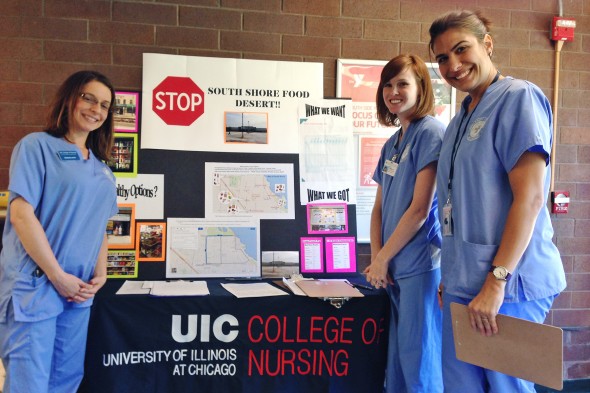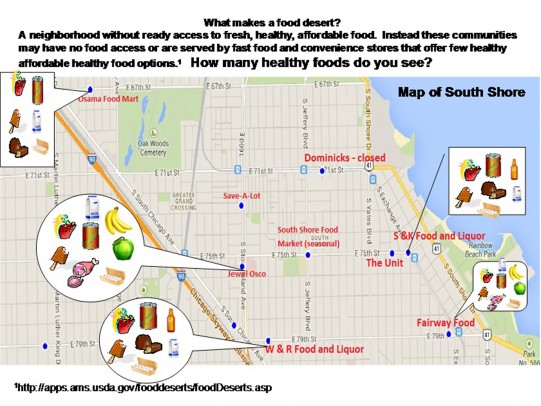Nursing students push for change in South Shore food desert

Nursing students Vanessa Levine (from left), Alicia Ottenweller and Julie Gasperec met with residents and researched the lack of grocery stores in South Shore. “I don’t feel like our duty is done,” Levine says.
What started as a class project has ignited nursing student Vanessa Levine’s passion to bring about change in Chicago’s South Shore neighborhood.
Levine and classmates Julie Gasperec and Alicia Ottenweller researched the lack of grocery stores in South Shore and met with residents to hear their stories.
Their class ended June 20, but they are continuing their work, making a push for change at City Hall.
“I don’t feel like our duty is done,” said Levine, a student in the College of Nursing’s Graduate Entry Program.
“There needs to be more discussions about what solutions can be thrown onto the table. There is an absolute need for healthy food options.”
Residents of the South Shore neighborhood live in a food desert, Levine said. A Dominick’s store closed at 71st Street and Jeffery Boulevard in December, leaving residents with few options other than their local convenience store or gas station.
The area also faces high levels of poverty and crime, she said.
“Most people shop at their corner store, which really doesn’t provide a lot of healthy food,” Levine said. “You look around and think, ‘Where can I buy some apples? Where can I buy some fresh meat?’ You can’t.”
Students in the Graduate Entry Program — an accelerated nursing program for students who have degrees in other fields — participate in a community nursing rotation, creating a project to intervene in a Chicago community where there’s a health need, said Geraldine Gorman, coordinator of the Population Focused Nursing course.
 “We really stress the foundation of public health nursing and social justice,” said Gorman, assistant professor of health systems science.
“We really stress the foundation of public health nursing and social justice,” said Gorman, assistant professor of health systems science.
“We’re not going into the community to tell the people what they need. We come into these communities to listen and understand from the people who live there how we can best support their needs.”
Levine, Gasperec and Ottenweller hosted a booth at the South Side YMCA June 13 to raise awareness of the food desert and promote healthy habits.
Gasperec lives in South Shore but she has a car, so she drives to Hyde Park or a grocery store on the border of South Shore and Woodlawn to shop. Those without their own transportation must take two buses to get to the nearest grocery store, Levine said.
“The closing of the Dominick’s really hurt my neighbors who don’t have cars,” Gasperec said.
The nursing students asked residents to sign their petition asking Mayor Rahm Emanuel to advocate on behalf of South Shore. They are taking their petition to City Hall and working to schedule meetings with the mayor or other city officials.
“We realize that he doesn’t hold this magic wand where he can force a decent grocer to come here, but we’re hoping for him to advocate for us,” said Gasperec, who plans to become a school nurse. “We created some momentum that I would really hate to break.”
The community rotation helped Levine realize that she wants to be a nurse advocate when she finishes her program next year. She was a scientist for a pharmaceutical company and research coordinator at the University of Chicago’s lymphoma department before joining UIC’s nursing program.
“I would really love to work in the public sector doing community outreach or working at the policy level — I feel like that’s the way for you to be able to change people’s minds,” she said.
Gorman hopes the community nursing rotation helps students learn about the impact they can have in the community.
“I hope that students really appreciate and have a real respect for what you can accomplish when you work with people in the communities in which they live,” she said.
“And that they come away with a certain sense of outrage about the disparities that still exist in our communities and the suffering it causes to people who live there.”
